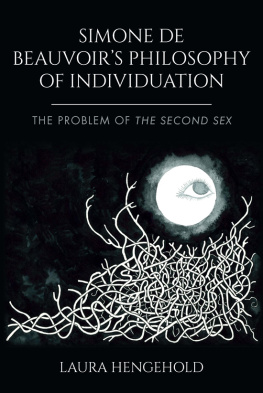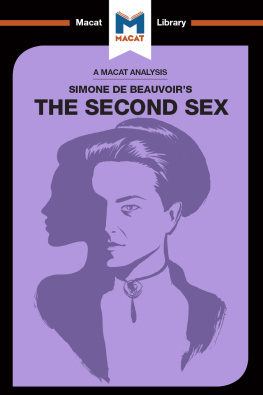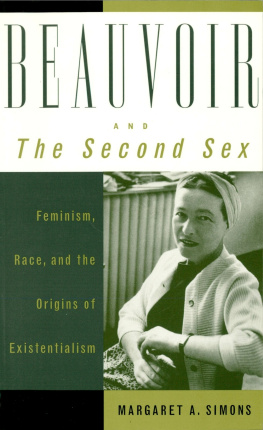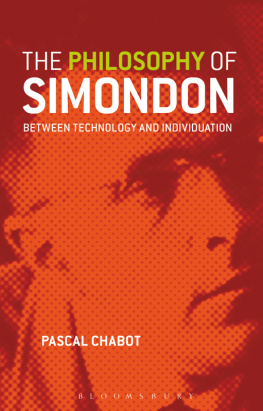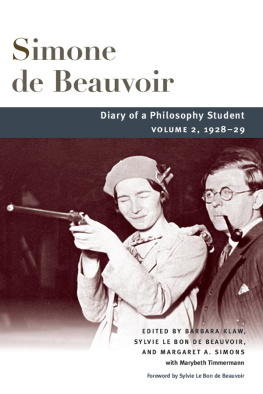Laura Hengehold - Simone De Beauvoirs Philosophy of Individuation
Here you can read online Laura Hengehold - Simone De Beauvoirs Philosophy of Individuation full text of the book (entire story) in english for free. Download pdf and epub, get meaning, cover and reviews about this ebook. publisher: Edinburgh University Press, genre: Religion. Description of the work, (preface) as well as reviews are available. Best literature library LitArk.com created for fans of good reading and offers a wide selection of genres:
Romance novel
Science fiction
Adventure
Detective
Science
History
Home and family
Prose
Art
Politics
Computer
Non-fiction
Religion
Business
Children
Humor
Choose a favorite category and find really read worthwhile books. Enjoy immersion in the world of imagination, feel the emotions of the characters or learn something new for yourself, make an fascinating discovery.
- Book:Simone De Beauvoirs Philosophy of Individuation
- Author:
- Publisher:Edinburgh University Press
- Genre:
- Rating:5 / 5
- Favourites:Add to favourites
- Your mark:
- 100
- 1
- 2
- 3
- 4
- 5
Simone De Beauvoirs Philosophy of Individuation: summary, description and annotation
We offer to read an annotation, description, summary or preface (depends on what the author of the book "Simone De Beauvoirs Philosophy of Individuation" wrote himself). If you haven't found the necessary information about the book — write in the comments, we will try to find it.
Simone De Beauvoirs Philosophy of Individuation — read online for free the complete book (whole text) full work
Below is the text of the book, divided by pages. System saving the place of the last page read, allows you to conveniently read the book "Simone De Beauvoirs Philosophy of Individuation" online for free, without having to search again every time where you left off. Put a bookmark, and you can go to the page where you finished reading at any time.
Font size:
Interval:
Bookmark:

Simone de Beauvoirs Philosophy of Individuation
Simone de Beauvoirs Philosophy of Individuation
The Problem of The Second Sex
LAURA HENGEHOLD
EDINBURGH
University Press
Edinburgh University Press is one of the leading university presses in the UK. We publish academic books and journals in our selected subject areas across the humanities and social sciences, combining cutting-edge scholarship with high editorial and production values to produce academic works of lasting importance. For more information visit our website: edinburghuniversitypress.com
Laura Hengehold, 2017
Edinburgh University Press Ltd
The Tun Holyrood Road, 12(2f) Jacksons Entry, Edinburgh EH8 8PJ
Typeset in 11/13 Adobe Sabon by
IDSUK (DataConnection) Ltd, and
printed and bound in Great Britain by
CPI Group (UK) Ltd, Croydon CR0 4YY
A CIP record for this book is available from the British Library
ISBN 978 1 4744 1887 4 (hardback)
ISBN 978 1 4744 1888 1 (webready PDF)
ISBN 978 1 4744 1889 8 (epub)
The right of Laura Hengehold to be identified as the author of this work has been asserted in accordance with the Copyright, Designs and Patents Act 1988, and the Copyright and Related Rights Regulations 2003 (SI No. 2498).
Contents
Acknowledgements
Maybe every book is a silent conversation that picks up where voices leave off. A books singularity evolves according to multiple temporalities and I am sure many of my interlocutors did not know they were responding to one another by way of a problem that only appeared after many years, any more than they knew how much they sustained me in the act of writing. This book emerged between Cleveland and Paris and thus, between my networks in both cities. It works in part because of its gaps and failures, which are also the authors responsibility after friends have done everything possible to enhance its powers.
First, I want to recognise Case Western Reserve University for making possible the sabbatical year during which this book was written. I also want to thank Maggie Kaminski, John Orlock, and Peter Knox of the Baker-Nord Center for the Humanities at CWRU for enabling me to present portions of this manuscript at several international Deleuze Studies conferences and for a research grant to finalise the manuscript. Anne Van Leeuwens thoughtful and imaginative approach to phenomenology gave me faith that this project had a future. She and Cheryl Toman enabled my sabbatical in countless practical ways; as did Shannon French, who gave her extraordinary administrative gifts to run our department in my absence. I am lucky to have such enthusiastic and supportive colleagues. Last but not least, Megan Weber offered moral support and outstanding editorial assistance.
My students were essential stimuli to thinking, particularly Tony Yanick, whose passion for Deleuze made it possible for me to justify over half a year working through Difference and Repetition; Jason Walsh, thanks to his determination to understand Spinoza and materialist philosophy of history; and k.c. Layton, for numerous thoughtful conversations testing both of our investments (or lack thereof) in the molar concept of woman. Brent Adkins and Andrew Cutrofello know how deeply I am indebted to them, not only for carefully reading all or most of this manuscript and others, but also for patiently and cheerfully enduring, via email, the near-daily roller coaster of my affects. In addition, Ryan Johnson, Audrey Wasser, Joe Hughes, and especially Jeff Bell were generous with their reading time and expertise on Deleuze, while I thank Ewa Ziarek and two anonymous readers at Edinburgh University Press for encouragement and specific improvements regarding the Introduction. I also benefited from the conversations, questions and ambiance at the Deleuze Studies conferences, even if I cannot remember or name everyone who contributed a few molecules.
To Seloua Luste Boulbina, Brahim Tissini and Sylvain Tessier for friendship and provocation in Paris, mille fois merci. To Kyoo Lee, who like the incorporeal event moves in all directions at once but is rarely actualised in a geographical state of affairs, there are not enough languages to express my appreciation for your experimental spirit. And likewise to colleagues and friends in Cleveland: particularly Kenny Fountain, Renee Holland-Golphin, Matt Bakaitis, Andrew Dessecker and Joe Cairnes. Whether or not they know it, my family is an imperceptible part of this project, so I do not want to overlook whatever support we have been and may yet be for one other. Finally, for her optimism, her sincerity, and her extraordinary professionalism, I am deeply grateful to have worked with Carol Macdonald at Edinburgh University Press, as well as with James Dale and Christine Barton, who brought this text to material fruition.
Excerpt(s) from The Second Sex by Simone de Beauvoir and translated by Constance Borde and Sheila Malovany-Chevallier, translation copyright 2009 by Constance Borde and Sheila Malovany-Chevallier. Used by permission of Alfred A. Knopf, an imprint of the Knopf Doubleday Publishing Group, a division of Penguin Random House LLC. All rights reserved.
From The Second Sex by Simone de Beauvoir, translated by Borde/Malovany-Chevallier.
Published by Jonathan Cape.
Reprinted by permission of The Random House Group Limited.
Abbreviations
References are to English texts and translations. In some cases, corresponding pages to the original French edition are given after a / (slash) and publication data may be found in Works Cited.
AO | Deleuze and Guattari, Anti-Oedipus (LAnti-dipe) |
BN | Sartre, Being and Nothingness |
DR | Deleuze, Difference and Repetition (Diffrence et rptition) |
EA | Beauvoir, The Ethics of Ambiguity (Pour une morale de lambigut) |
FC | Beauvoir, Force of Circumstance |
FM | Nzegwu, Family Matters |
IC | Nancy, The Inoperative Community |
IPC | Simondon, LIndividuation Psychique et Collective |
LS | Deleuze, TheLogic of Sense (Logique du sens) |
MDD | Beauvoir, Memoirs of a Dutiful Daughter |
PC | Beauvoir, Pyrrhus and Cineas (Pyrrhus et Cines) |
PL | Beauvoir, Prime of Life (La force de lge) |
SS | Beauvoir, The Second Sex (Le deuxime sexe, 2 vols) |
TE | Sartre, Transcendence of the Ego |
TFW | Bergson, Time and Free Will |
TP | Deleuze and Guattari, A Thousand Plateaus (Mille plateaux) |
WIP | Deleuze and Guattari, What is Philosophy? (Quest-ce que la philosophie?) |
Chapter 1
Introduction: Blocked Singularities
One is not born, but rather becomes, woman (SS 283/2:13). On ne nat pas femme, on le devient. Simone de Beauvoirs statement puts becoming at the heart of her ontology. However, we tend to focus on what becoming a woman might mean, taking the meaning of becoming as self-evident. We are not born philosophers either, and just as womanhood may be something we never actually achieve, becoming a philosopher is not something that happens once and for all. A focus on becoming unsettles even our confidence as to what being born might mean.
Next pageFont size:
Interval:
Bookmark:
Similar books «Simone De Beauvoirs Philosophy of Individuation»
Look at similar books to Simone De Beauvoirs Philosophy of Individuation. We have selected literature similar in name and meaning in the hope of providing readers with more options to find new, interesting, not yet read works.
Discussion, reviews of the book Simone De Beauvoirs Philosophy of Individuation and just readers' own opinions. Leave your comments, write what you think about the work, its meaning or the main characters. Specify what exactly you liked and what you didn't like, and why you think so.

